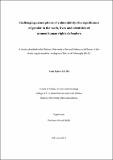| dc.contributor.advisor | Reilly, Niamh | |
| dc.contributor.author | Lajoie, Amie | |
| dc.date.accessioned | 2018-02-16T14:32:38Z | |
| dc.date.available | 2018-02-16T14:32:38Z | |
| dc.date.issued | 2018-02-16 | |
| dc.identifier.uri | http://hdl.handle.net/10379/7141 | |
| dc.description.abstract | In 1998, the United Nations General Assembly adopted the Declaration on the Right and Responsibility of Individuals, Groups and Organs of Society to Promote and Protect Universally Recognised Human Rights and Fundamental Freedoms, or as it is most commonly referred to: the "1998 Declaration on Human Rights Defenders". Following a 13-year drafting process, the adoption of the Declaration was hailed as a “milestone” by the international human rights community – and practitioners have since formed an expansive network of international, regional and national NGOs and agencies that focus on providing support and protection to this group. The term “human rights defender” (HRD) encompasses those who “individually or with others, act to promote or protect human rights” (OHCHR 2004, 2).
My thesis scrutinises the experiences and identities of women in this framework, referred to as “women human rights defenders”. Conversations about “gender” and “women” in popular HRD discourses tend to slip into a common logic that represents women defenders as a “particularly vulnerable” group compared to their male counterparts. Typically, the “vulnerability” alluded to is embedded in essentialised ideas about women’s bodies as inherently susceptible to gender-based forms of violence. This thesis builds on feminist critique of static gender norms and stereotypes and of gender bias in the wider international human rights project. Specifically, I investigate the significance of “being a woman” in the HRD framework, paying careful attention to the voices and insights of women defenders themselves. I focus on how narrow ascriptions of a “women human rights defender” as a “vulnerable female subject” relate to women’s self-perceptions and experiences in the HRD paradigm. Ultimately, I argue that the ways in which women defenders experience vulnerability differ from popular understandings of female vulnerability. In particular, the thesis reveals how the masculine ideal promulgated in HRD discourses operates to limit the types of subject positions available to women in the framework and to reinforce the routine marginalisation of women’s identities and experiences in this space. Based on interviews with 11 women defenders, the thesis reveals how women human rights defenders assert their identity and challenge the gender biases of the paradigm. | en_IE |
| dc.rights | Attribution-NonCommercial-NoDerivs 3.0 Ireland | |
| dc.rights.uri | https://creativecommons.org/licenses/by-nc-nd/3.0/ie/ | |
| dc.subject | Gender | en_IE |
| dc.subject | Human rights | en_IE |
| dc.subject | Feminist theory | en_IE |
| dc.subject | Human rights defenders | en_IE |
| dc.subject | Vulnerability | en_IE |
| dc.subject | Human rights activism | en_IE |
| dc.subject | Women's human rights | en_IE |
| dc.subject | Women human rights defenders | en_IE |
| dc.subject | Political Science and Sociology | en_IE |
| dc.title | Challenging assumptions of vulnerability: the significance of gender in the work, lives and identities of women human rights defenders | en_IE |
| dc.type | Thesis | en_IE |
| dc.contributor.funder | Galway Doctoral Scholarship | en_IE |
| dc.local.note | "Human rights defenders" are a category of activists recognised by the United Nations. Since 1998, an international community of practitioners, NGOs and UN agencies has emerged to support the work of this group. However, women are routinely invisible and silenced in this space, oftentimes categorised singularly in terms of their vulnerability. This PhD thesis scrutinises women's experiences in this framework as well as the broader international human rights project.
As part of this research, I spoke directly with women who self-identify as human rights defenders, and discovered how their experiences of vulnerability differ from the assumptions of the practitioner community. In fact, these narrow perceptions can adversely affect women. This thesis, therefore, challenges these assumptions with the objective of helping the international community better support women human rights defenders in their work. | en_IE |
| dc.local.final | Yes | en_IE |
| nui.item.downloads | 2832 | |


